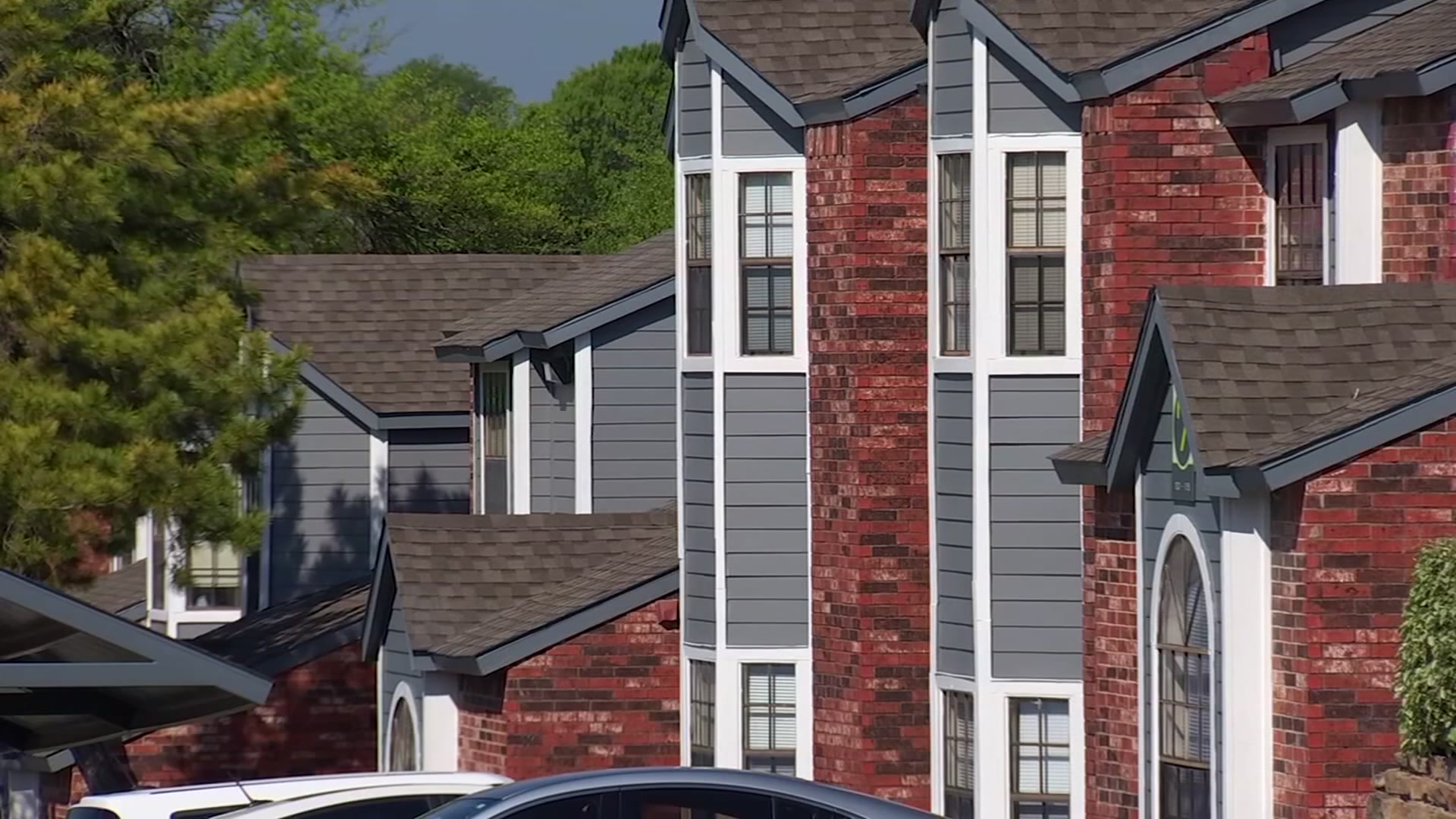Although the Centers for Disease Control’s Eviction Moratorium is extended through the end of March, some renters say they are at risk of homelessness sooner because their leases are ending.
“This is becoming a huge problem now that we're almost a full year into the pandemic. A lot of people's leases are coming to their end. The CDC order, while helpful in some respects, doesn't protect everyone. In fact, it doesn’t protect a lot of people,” said attorney Mark Melton – who founded Dallas Evictions 2020 to connect renters with free legal help during the pandemic.
More from NBC 5 Responds
Melton said the CDC’s eviction moratorium doesn’t cover holdover tenants who overstay their leases. If they’ve fallen behind on rent, Melton said their options are limited.
Renters can’t stay and they can’t go
“We didn't see it coming. Now, we have three weeks and we have no idea what to do,” said Nadia Guardado of Irving.
Guardado and her husband, David Delacruz, are one of the North Texas families with nowhere to go when their lease ends at the end of the month.
The couple, who work in the music industry, saw their work dry up nearly overnight last March. Guardado said her boss received a PPP loan that kept her working for a couple of months, but she’s back on furlough. The couple said they got by on savings, unemployment benefits and credit cards until falling behind on rent in September.
“We've never been behind anywhere we've ever lived,” said Guardado.
The family turned in their signed CDC declaration to delay eviction for nonpayment of rent. Their landlord hasn’t sued for eviction, but the apartment complex did provide notice it would not renew the family’s lease when it ends on February 28.
Delacruz is starting a painting business and said the family is getting back on their feet. They said they found another apartment they could afford - moving forward. During the application process, their rental history didn’t check out since they owe their current landlord just over $7,600 in back rent and late fees. The new apartment fell through.
“When I got that phone call, it dawned on us: oh my God, we're going to be essentially homeless,” said Guardado. “What do you do? You can't stay here. Rightfully, our lease is up and the landlords need to make money off the unit.”
“We're getting to the point where if we do go somewhere, we can make it happen even if we have to set up a payment plan to pay off what we owe here,” said Delacruz. “Not being able to get in somewhere because of how far behind we are, we don’t have $7,000 to give.”
Now, time is running out for the couple who have three kids under three at home: a son turning three in April, a two-year-old daughter and a two-month-old infant girl.
“Looking at my kids and knowing that I'm struggling so hard to keep them alive and it's not their fault. Of course not. You just want to feel like supermom and then you can't pull this money out of anywhere,” said Guardado.
Melton said that’s the case for many clients who found new jobs in the pandemic. They can’t come up with thousands of dollars in back rent and late fees, yet they can’t find another apartment to move into.
“This notion that now that you're employed you can just go find a new place to live, that is false,” said Melton. “There is such a limited number of landlords that will accept people that have evictions because there's so many people competing for those. In fact, most of them are already full. There's no place for these people to go.”
“We've got to do a better job of figuring out how do we house people that have evictions on their record that have no other options? Because this was from a pandemic. This is through no fault of their own,” added Melton.
“This is many households”
According to the most recent Census Pulse survey, 32.9% of people in the DFW area who took the survey between January 20 and February 1 reported they live in households that are not current on rent or mortgage payments and where eviction or foreclosure in the next two months is either very likely or somewhat likely.
Sandy Rollins, executive director of the Texas Tenants’ Union, said it’s time to stop simply extending the same federal eviction moratorium. It does not provide rental relief to landlords and it doesn’t stop all evictions for people who have lost income in the pandemic.
“The policymakers need to step up and prevent this massive tragedy from occurring. This is not just one household. This is many households,” said Rollins.
Rollins said every level of government, including local governments, could step in. Rollins pointed to other Texas cities that enacted broader eviction moratoriums to prevent homelessness at a time when COVID-19 community spread is still high.
“People need to stay housed to stay safe,” said Rollins. “It's not just for them and their particular household, it's for the community as a whole.”
Filling the gaps in the moratorium
“I think when they first issued this order, they tried to narrowly tailor it so that it wouldn't violate any constitutional issues, but we’re at the point right now where we have new issues,” said Melton.
Melton and Rollins said the CDC’s order intended to protect people from the spread of COVID-19, but it’s too limited to be effective as the pandemic stretches into a full year.
“We've got to do better and make amendments to these rules. Otherwise, we're going to see a lot of homeless people that we really don't need to see,” said Melton. “We have the money coming to pay the back rent so that the tenant can stay housed. The landlord wins too because they're going to get paid.”
Critics have long pointed to the limits of an eviction moratorium that doesn’t provide rental relief – effectively shifting the economic burden onto landlords who have their own obligations.
New program to help pay rent and utilities
Melton said he’s encouraging landlords to be patient before moving to evict renters as the Texas Department of Housing and Community Affairs launches the Texas Rent Relief Program on February 15.
Starting at 8 a.m. on Monday, the program begins taking applications for rental and utility assistance. Landlords can apply on behalf of renters and tenants can apply for direct relief.
TDHCA Executive Director Bobby Wilkinson said the program aims to pay out assistance for past and future rent within about two weeks after someone completes the application with the required documents.
Wilkinson told NBC 5 Responds the application process will be more streamlined than the applications some renters saw after the CARES Act passed last year.
“This is new money, it's flexible from Congress, straight from the U.S. Treasury for this purpose. I think it should be faster,” said Wilkinson.
Wilkinson encourages Texans to check the website now to determine if they qualify for assistance. Gather your documentation and be ready to apply as soon as applications open Monday morning.
Households must have income at or below 80% of the area median income. Priority will be given to households with incomes at or below 50% area median income or households where at least one person is currently unemployed or was unemployed 90 days prior to applying.
You can find out if you fall within the area median income requirements here. Look up your county and your household size. In Dallas County, for example, a family of four qualifies if their household income is $68,950 or less.
Texas has $1.3 billion to spend in federal money authorized in the latest stimulus package passed by Congress in December. Part of the money will also fund a planned expansion of an eviction diversion program in Texas.
Families running out of time
Guardado and Delacruz’s apartment complex declined to speak to NBC 5 Responds. In Texas, private market landlords are not obligated to renew leases. Leases go month-to-month unless a landlord gives notice. Guardado and Delacruz said their landlord provided written notice December 24.
Guardado said the family qualifies for the new rent relief program in Texas and plans to apply in hopes of paying back their current landlord. The family also received a letter from the apartment complex, asking if they would participate in the program.
With two weeks to find a solution, the family created a Go Fund Me page.
An uneasy decision for a family that has never fallen behind on rent until a global pandemic.
“Ask for help from strangers? We've never had to do that,” said Delacruz. “It's just crazy to see what this has done to the people. Now, everybody is resorting to having to basically beg for help.”
“You have no control over it and you don't know when it's going to end,” said Guardado. “You catch yourself saying: When the pandemic's over, when COVID’s over. You never really know when it's going to be over.”
NBC 5 Responds is committed to researching your concerns and recovering your money. Our goal is to get you answers and, if possible, solutions and resolution. Call us at 844-5RESPND (844-573-7763) or fill out our Customer Complaint form.



